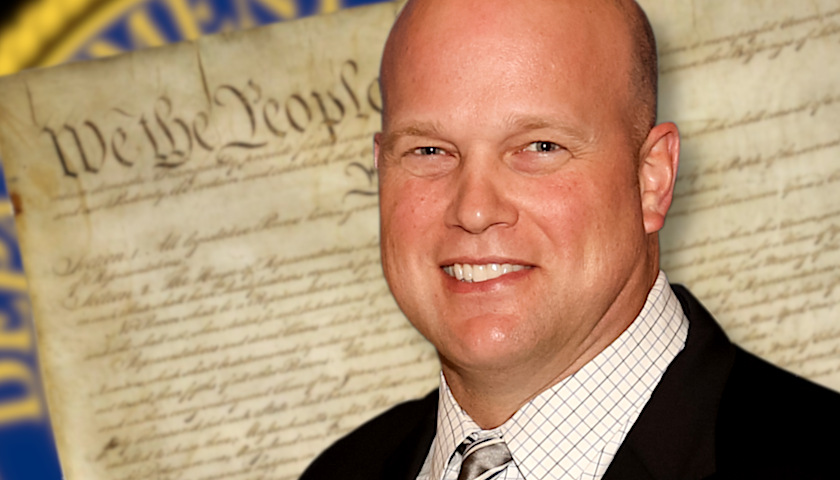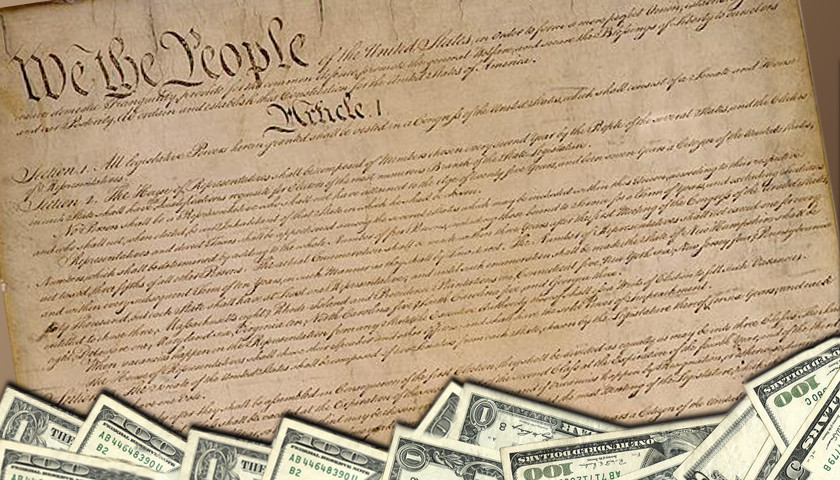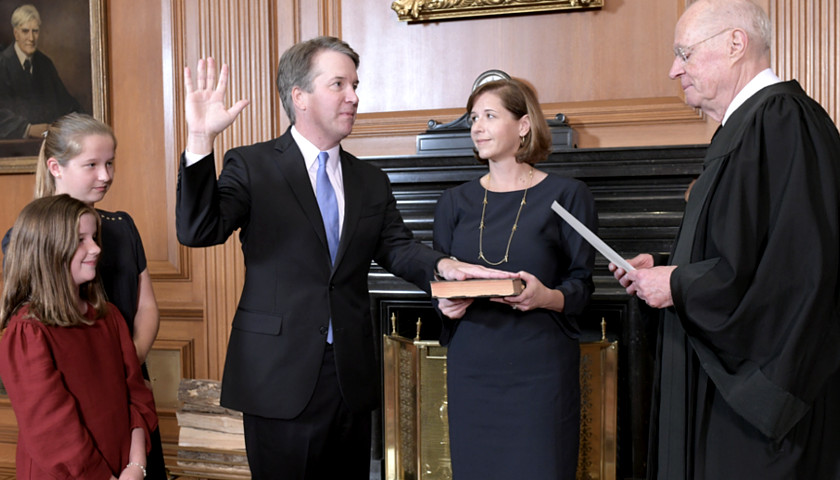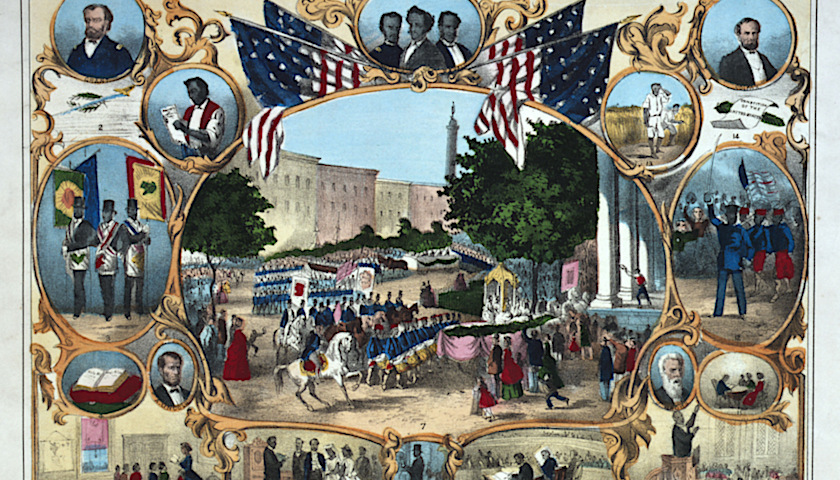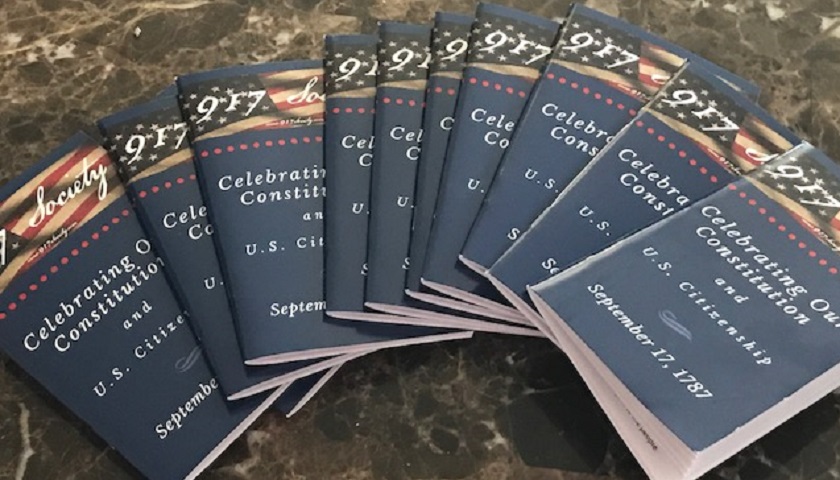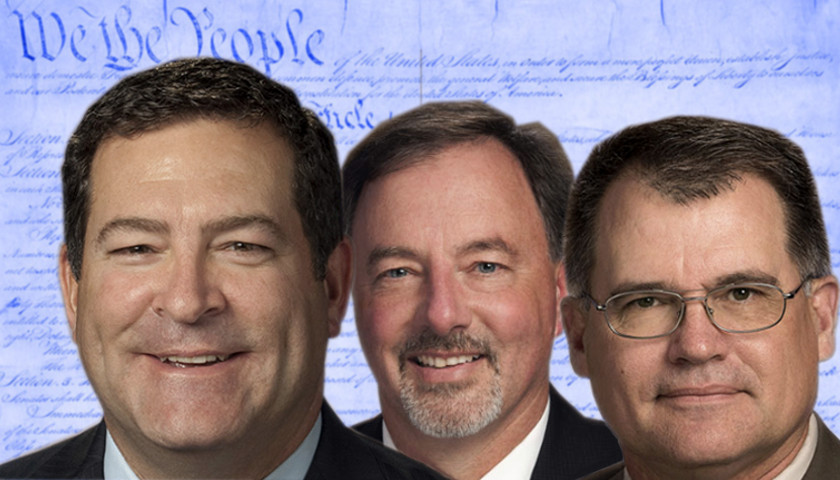Among the many duties of the President of the United States is one that is found in Article II, Section 3 of the U.S. Constitution: “He shall from time to time give to the Congress Information of the State of the Union, and recommend to their Consideration such Measures as he shall judge necessary and expedient….” The Constitution does not specify in what manner the President is expected to furnish such “information” nor does it even suggest any certain season of the year — or any particular interval of time — that such “information” be provided. And, if conveyed verbally, the Constitution is silent as to from what physical location the President should perform this function. Commonly referred to as the “State-of-the-Union” address, as President Franklin Delano Roosevelt dubbed it in 1934, President George Washington, the first man to occupy the high office of President of the United States, delivered the initial such regular, annual message before a joint session of Congress on January 8, 1790. President Thomas Jefferson, our country’s third President, decided it better instead to send his remarks in written form to then be read to the membership by high-ranking Congressional employees. Jefferson’s idea held for more…
Read the full storyTag: U.S. Constitution
Commentary: The U.S. Constitution Allows For The Appointment Of Temporarily ‘Acting’ Officials Without Senate Confirmation
In its Article II, Section 2, Clause 2, the United States Constitution provides that the President of the United States: …by and with the Advice and Consent of the Senate, shall appoint Ambassadors, other public Ministers and Consuls, Judges of the supreme Court, and all other Officers of the United States whose Appointments are not otherwise provided for, and which shall be established by Law…” This means that, by a simple majority vote of the 100-member U.S. Senate, the President may nominate — and the Senate may confirm — various appointees within the Executive branch and within the Judicial branch of the federal government. In the aftermath of the November 6, 2018, general election — and the Republican Party enjoying a net gain of three seats in the U.S. Senate — President Donald Trump should experience less difficulty, during the upcoming 116th Congress (2019-2020), with how his nominees are received in the nation’s highest legislative body, than had been the case during the 115th Congress. But not every appointment requires action by the U.S. Senate — regardless of whether that body is officially in session or is in recess between sessions. The Constitution’s Article II, Section 2, Clause 3, reads…
Read the full storyCommentary: What The U.S. Constitution Really Says On The Subject Of Impeachment And Trial Removal Of The President
Before then-President-elect Donald Trump could even take the official oath of office on January 20, 2017, his critics were already chattering about the possibility of Trump’s tenure in the White House being truncated by means of involuntary removal. Throughout 2017 and 2018, there has been, and continues to be, spirited discussion by the President’s detractors of the possibility of expelling him from office by means of the impeachment-and-trial process that is found in separate parts of the U.S. Constitution. One of the most ardent advocates of ousting President Trump has been U.S. Representative Maxine Waters (D-California). Another has been her colleague, U.S. Representative Al Green (D-Texas) who actually went so far as to offer articles of impeachment against the President only to be soundly rebuffed, as recently as January 19, 2018, by a procedural motion-to-table Green’s House Resolution No. 705 with 355 yeas, 66 nays, 3 “present”, and 6 “not voting”. Prior to the recent November 6, 2018, general election, some members of the U.S. House of Representatives vowed that, if the partisan composition of that body would flip from majority Republican to majority Democrat — which it certainly did on November 6th — efforts to impeach the President would…
Read the full storyCommentary: The Migrant ‘Caravan’ Marching Northbound To Arizona, California, Nevada, New Mexico and Texas, and What The U.S. Constitution Has To Say About It
The United States Constitution does contain a few references relative to immigration and naturalization as well as to persons seeking to enter the United States in contravention of its laws — whether violently or non-violently and whether singly or in the form of a human tsunami. In its Article I, Section 8, Clause 4, the Constitution specifically grants Congress the power “To establish a uniform Rule of Naturalization….” By expressly allocating this capacity to Congress, the Constitution seeks to prevent the confusion which would inevitably result if an individual state could itself bestow U.S. citizenship upon a person not born within the boundaries of that — or any other — state. Construing Clause 4, the United States Supreme Court, in the 1892 case of Boyd v. Nebraska ex rel. Thayer, defined “naturalization” as “…the act of adopting a foreigner, and clothing him with the privileges of a native [U.S.] citizen.” In Clause 11 of that same Article I, Section 8, the Constitution authorizes Congress “To declare War…and make Rules concerning Captures on Land and Water….” Interpreting Clause 11, the High Court ruled in the 1795 case of Penhallow v. Doane that the war power of the United States government is…
Read the full storyWhat The United States Constitution Really Says About ‘Birthright Citizenship’
In Section 1 of its 14th Amendment, the U.S. Constitution reads in pertinent part: “All persons born or naturalized in the United States, and subject to the jurisdiction thereof, are citizens of the United States and of the State wherein they reside.” Proposed by Congress in 1866 — and deemed by a procedurally-rare subsequent vote of Congress to have been validly ratified by the sufficient number of state legislatures in 1868 — the 14th Amendment is among the Constitution’s lengthiest and it touches upon a number of different topics each of which could stand alone. Authorship of the above-quoted words has been attributed to United States Senator Jacob Howard of Michigan. This particular provision of the 14th Amendment is generally acknowledged to overturn the decision of the U.S. Supreme Court in the now-infamous 1857 case of Dred Scott v. Sandford in which it had been determined that African-Americans born in the United States — to parents likewise born within the United States — could not be deemed to be American citizens. Often overlooked by persons professing to be in-the-know about the 14th Amendment, and what it does — or does not — convey about birth citizenship are the key words…
Read the full storyU.S. Constitution Does Not Guarantee That You Can Always Pay With Cash
In its Article I, Section 8, Clause 5, the United States Constitution provides: “The Congress shall have Power…To coin Money, [and] regulate the Value thereof….” And since the Constitution’s drafting in the year 1787, cash has played a vital role in the nation’s economy as the generally-accepted medium of exchange. Barter still exists, but on a relatively limited basis and, although there has been chatter for decades about America one day becoming a completely “cashless” society, that day has yet to arrive. In modern times, there are, of course, multiple methods of payment for goods and services as well as to pay down debt in installments — or to completely extinguish it in one fell swoop. In addition to cash, there are checks, credit cards, electronic money transfers and other means of payment. Pursuant to the above-quoted provision from the U.S. Constitution, Congress enacted the Coinage Act of 1965 (last amended by two bills approved by the 97th Congress in Public Laws Nos. 97-258 and 97-452; the 1965 Act is the successor to the Coinage Act of 1792 as well as the Coinage Act of 1873). The 1965 version includes Title 31 United States Code Subchapter 5103 which, from 1983…
Read the full storyCommentary: The U.S. Constitution Narrowly Prevailed Over Mob Rule And Character-Assassination
On October 6, 2018, now-Associate Supreme Court Justice Brett M. Kavanaugh was formally confirmed by the U.S. Senate — in a rare Saturday session — with a slender vote of 50 yeas and 48 nays in the 100-member body. Both of Tennessee’s Senators, Republicans Lamar Alexander and Bob Corker, cast their votes in favor of Kavanaugh joining the highest court in the land. The last time that someone gained membership onto the High Court by such a close margin was on May 12, 1881, when Thomas Stanley Matthews (nominated by President James Garfield) squeaked by with 24 yeas and 23 nays in the Senate. Matthews went on to distinguish himself on the Court as a foe of racial discrimination when he wrote the Opinion in the 1886 case of Yick Wo v. Hopkins, striking down the City of San Francisco’s then-policies of restricting the ability of Chinese immigrants in that city — and placing extraneous procedural obstacles in their path — to establish businesses there, thus infringing upon the federal Constitution’s 14th Amendment. A short time after this past Saturday’s 50-48 vote, Chief Justice John Roberts administered the official oath to Kavanaugh as the 114th Justice of the Supreme Court, thereby…
Read the full storyThe Would-Be ‘State of Franklin’ That Never Officially Existed
The United States Constitution does, of course, contain guidelines as to how a territory may enter the Union as a full-fledged state on an equal footing with all previously-existing states. The last time that any new states were added to the United States was in the year 1959 when Alaska became the nation’s 49th state and Hawaii became the country’s 50th state. Specifically, the U.S. Constitution’s Article IV, Section 3, Clause 1 — which requires only a simple majority vote — reads: “New States may be admitted by the Congress into this Union; but no new States shall be formed or erected within the Jurisdiction of any other State; nor any State be formed by the Junction of two or more States, or parts of States, without the Consent of the Legislatures of the States concerned as well as of the Congress.” There has been recent chatter about admitting Puerto Rico into the Union as the nation’s 51st state. As the Constitution was not written until 1787 — and, once written, did not take effect until the following year — the procedure outlined within the still-in-force Articles of Confederation would have remained applicable to admission of news states up to…
Read the full storyTennessee and The U.S. Constitution’s 15th Amendment
The 15th Amendment to the U.S. Constitution, which granted freed former male slaves and any adult male citizen the right to vote, was ratified by the requisite three-fourths of all states and added to the Constitution in 1870. At the time there were 37 states, and when the 28th state ratified the amendment in February, 1870, the three-fourths standard was met. Tennessee was not among those 28 states. In fact, Tennessee did not get around to ratifying the 15th Amendment until more than 100 years later, in 1997. Here is that story: During the Reconstruction period in the American South, in the aftermath of the Civil War, three individual amendments were incorporated into the U.S. Constitution – each separated in succession by only a few years – pursuant to that document’s Article V. This trifecta ended a dry spell of more than 60 years of no amendments at all finding their way into the federal Constitution. The 13th Amendment, ending slavery, was adopted in 1865. The 14th Amendment, defining citizenship status, came along in 1868 (although there is some question as to whether its ratification process was 100 percent strictly by-the-book). And the 15th Amendment, granting to former male slaves –…
Read the full storyCommentary: 40 Years Of Congress Not Proposing Any Constitutional Amendments Does Not Mean That Changes To The Constitution Are Not Wanted
August 2018 marks the 40th anniversary of the very last time that Congress proposed an amendment to the United States Constitution. It was on August 22, 1978, that the 95th Congress offered to the state legislatures for ratification a constitutional amendment that–had it been ratified by the required number of states within its 7-year deadline on August 22, 1985–would have granted to Washington, D.C. two United States Senators and however many members of the United States House of Representatives the District of Columbia’s population would have warranted. But the lack of action by Congress over the past four decades in proposing constitutional amendments certainly has not meant that there is no desire among Americans to change the federal Constitution. Gaining momentum during that same decade of the 1970s was a movement within the state legislatures to trigger the calling of an “Article V Convention” whereby state lawmakers may largely–but not entirely–bypass a recalcitrant Congress and push for a federal constitutional amendment that, perhaps, Congress might understandably prefer to suppress. In this particular case, that would be an amendment requiring the federal budget to be in balance. Article V of the U.S. Constitution provides in pertinent part: “The Congress…on the application…
Read the full storyThe Proposed 1972 Equal Rights Amendment And Its Still-Unfinished Checkered History with Tennessee State Lawmakers
If you thought that the proposed Equal Rights Amendment (ERA) to the United States Constitution offered by the 92nd Congress to the state legislatures for ratification back in 1972 was just a distant memory–and a thing completely of the past–think again. Its cheerleaders during the 1970s endeavored to sell ERA as nothing more than guaranteeing equal legal rights for women and men. And, certainly, that had a nice ring to it. The U.S. Senate shouted its approval of ERA on March 22, 1972, with 84 yeas, 8 nays and 7 not voting. Previously, on October 21, 1971, the U.S. House of Representatives roared its blessing with 354 yeas, 24 nays and 51 not voting. And, with that, ERA was placed before the nation’s state legislatures for their consideration, pursuant to the well-established procedures found in the U.S. Constitution’s Article V. In tendering ERA to the states, the 92nd Congress had imposed a customary deadline of seven years–or until March 22, 1979–for America’s state lawmakers to fully ratify ERA in order for the measure to officially become part of the U.S. Constitution. With 50 states in the Union in 1972–and still 50 in it today–a proposed federal constitutional amendment must be…
Read the full story917 Society’s Work to Promote U.S. Constitution Featured in Ferrier Files on Fox 17 News
The 917 Society’s efforts to promote the U.S. Constitution were featured in a story Thursday by Dennis Ferrier on Nashville’s Fox 17 News. A nonpartisan nonprofit based in the Nashville area, the 917 Society aims to get a free copy of the Constitution to every eighth grader in Tennessee. “This is the one thing that binds us together no matter what we believe,” Joni Bryan, founder and executive director of the 917 Society, told Fox 17. Bryan has been mailing or delivering hundreds of copies of the Constitution to schools across the state. The copies include an oath of citizenship to make the Constitution more personally meaningful to the students receiving them. Ann Marie Crozier, a history teacher at Richview Middle School in Clarksville, is using the 917 Society booklets with her students. Crozier said students have taken better care of the Constitutions than is typical for materials associated with classroom activities. “We are not finding these in the trash can. We’re not finding them on the floor,” she told Fox 17. “I have one child that dropped hers on the floor and was real excited to get it back.” Thirteen-year-old Nicholas Newman, who was interviewed in Crozier’s classroom, said the…
Read the full storySeven Republican State Lawmakers to Represent Tennessee at Balanced Budget Amendment Planning Convention
Seven Republican Tennessee state lawmakers will head to Phoenix next week for the Balanced Budget Amendment Planning Convention. The purpose of convention, which starts Tuesday and is expected to last through Thursday or Friday, is to lay the groundwork for an anticipated convention convened under Article V of the U.S. Constitution to propose a balanced budget amendment. The lawmakers include Sens. Mark Green (R-Clarksville), Mike Bell (R-Riceville), Frank Niceley (R-Strawberry Plains) and Bill Ketron (R-Murfreesboro), and Reps. Jay Reedy (R-Erin), Sheila Butt (R-Columbia) and Dennis Powers (R-Jacksboro). The national convention of the states next week is the first held since 1861, when states met to discuss an amendment they hoped would avert a civil war. A resolution submitted to the convention by the Tennessee delegation is the first draft of rules presented for consideration, according to a news release issued by the Tennessee Senate Republicans. “The resolution filed by our delegation will serve as a guide to the discussion to get the ball rolling on rules to govern an Article V convention to balance the federal budget,” said Sen. Bell. “Our nation’s founders, Mason and Madison, insisted there be a method to amend the Constitution, fearing that at some point in…
Read the full storyCommentary: Donald Trump Schools Barack Obama on U.S. Constitution
Everyone knows that former President Barack Obama, our Great American Constitutional Law Professor, got mercilessly schooled by the Supreme Court during his eight years in office. Now he is getting schooled by a brash-talking, orange-haired reality-TV star and real-estate developer from Queens. I mean, this is humiliating. And so delicious to watch! President Trump never took…
Read the full story917 Society Offering Free Resources to Eighth-Grade Teachers to Help Educate Students About Constitution
Constitution Week is coming up soon, and the 917 Society is prepared to get the word out about why it is so important. The group is making available a free program and pocket constitutions to all Tennessee eighth-grade social studies teachers to mark Constitution Day Sept. 17 and Constitution Week, which falls around that date. The U.S. Constitution is an area of focus in the eighth-grade curriculum. The program consists of a short documentary film narrated by Nick Clooney and a variety of other free resources, including The Tennessee Star Constitution Series. Joni Bryan, founder of the 917 Society, has worked on the Constitution project for nearly three years. The project is funded with private donations. The group does not receive state or federal funds. “We want every year for all eighth-grade students to receive their Constitution as a rite of passage into citizenship,” Bryan said. This September 17 marks the 230th anniversary of the signing of the U.S. Constitution in 1787. The 917 Society’s mission is to reach 4.5 million students nationally, with Tennessee being the first state covered. The goal is to reach almost 90,000 Tennessee eighth-graders annually, including public, private and homeschooled students. Bryan said the group will…
Read the full storyNick Clooney Helps Tennesseans Promote Constitution at 917 Society Benefit
FRANKLIN, Tennessee — Most all Tennessee schoolchildren know at least a little about the U.S. Constitution, but members and supporters of the 917 Society say there’s more to be done to help students understand its background and importance. The Nashville area nonpartisan group held a benefit Tuesday evening at the Franklin Theatre to raise money for a project to put the Constitution in the hands of eighth-graders and to complete an educational documentary on the founding document narrated by Nick Clooney, a Kentucky journalist, author and former anchorman. Clooney, father of actor George Clooney and brother of the late singer Rosemary Clooney, attended the event Tuesday with his wife, Nina, to whom he has been married since 1959. In 2004, Clooney made an unsuccessful run in Kentucky for a congressional seat as a Democrat. He is widely respected for his media work and has received an Emmy for commentary and another for historical narration. Attendees at Tuesday’s event were treated to a video featuring Clooney, a skit and a panel discussion. In the video, Clooney said the Founding Fathers “in a brilliant fashion” were able to produce the Constitution through patience and negotiation. “It’s my dictionary of democracy and I have it…
Read the full story

